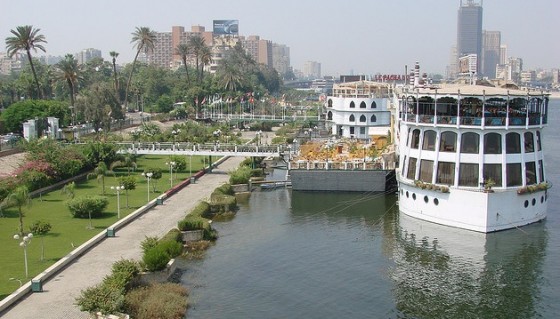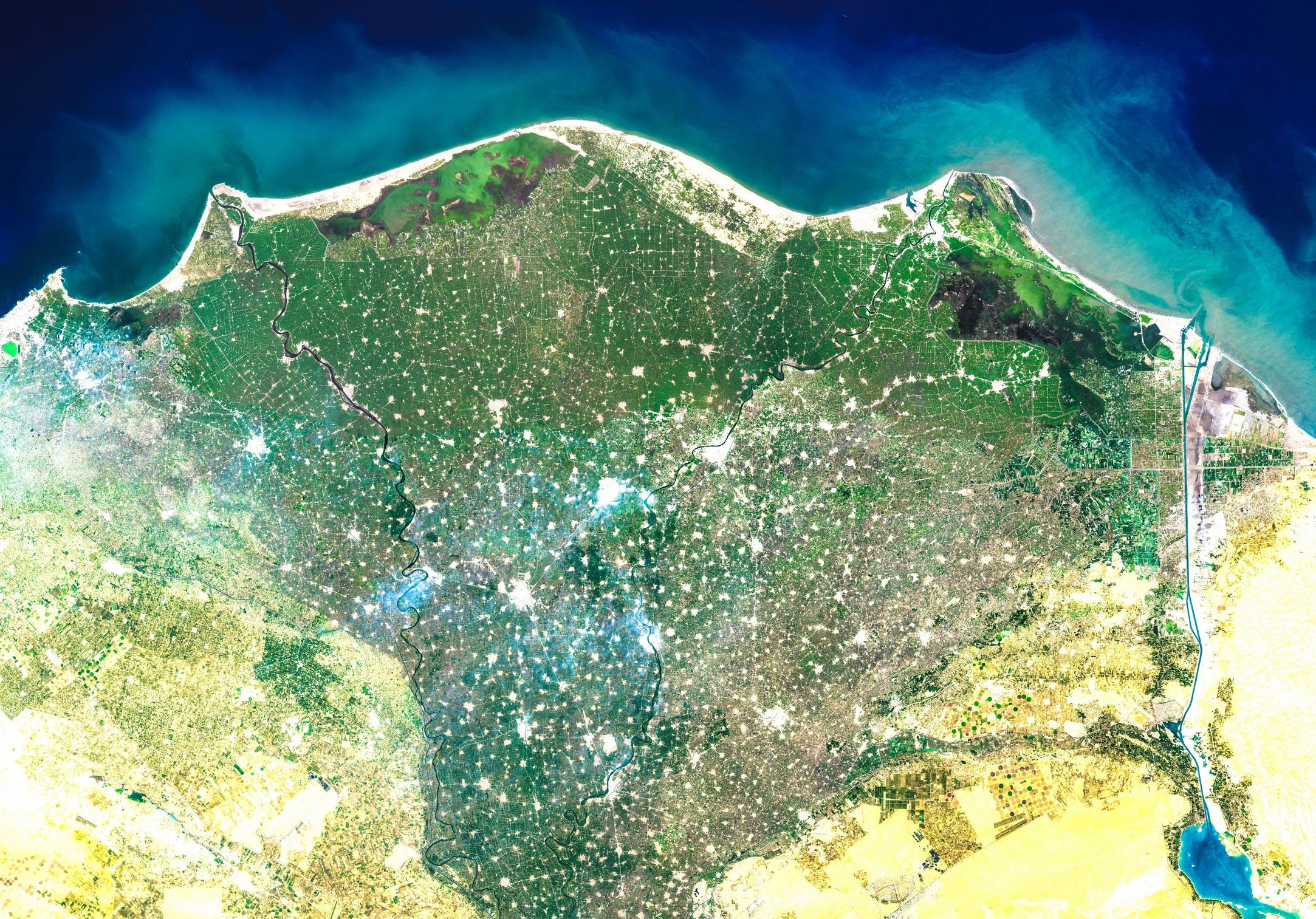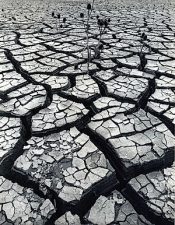 Ethiopia and other African countries upstream have plans to divert Nile River water. What does this mean for Egypt?
Ethiopia and other African countries upstream have plans to divert Nile River water. What does this mean for Egypt?
Leaking water pipes, evaporation and a rapidly growing population may be significant concerns for those trying to manage and plan water supplies in Egypt, but compounding such problems – and forcing Egyptians to rethink how they use water – is the threat posed by downstream countries which also want to take more water from the Nile, say observers. “Egyptians have to adapt to less water every day,” said Rida Al Damak, a water expert from Cairo University.
Egypt has a population of about 85 million, and receives an annual Nile water share of 55.5 billion cubic metres, according to experts. Around 85 percent of that water is used in agriculture, but a lot simply leaks away.
According to a 2007 research paper by Fathi Farag, an independent water expert, Egypt loses two billion cubic metres of water to evaporation, and three billion cubic metres to grass growing on the banks of the Nile and on river islands.
Around 40 percent of the remaining water – used domestically and in industry (2.3 billion cubic metres) – is lost to leaking pipes and drains, while 2.5 billion cubic metres are used to generate electricity, the paper says.
“If you calculate all this amount of lost water, you will discover that Egyptians are left with a fraction of what their country receives every year from the Nile,” Farag told IRIN. “This can also show why we should start to worry.”
For farmers like Hamdy Abuleinin, who was able to irrigate his 2.1 hectares of rice only after an argument over water with neighbours in Sharqia near Cairo, this year has proved difficult. “Finding water for irrigation is becoming a daily worry for farmers here,” he told IRIN.
International threat
A 1959 water-sharing agreement between Egypt and Sudan gives Egypt 55.5 billion cubic metres of Nile water, but according to Maghawri Shehata, an adviser to the irrigation and water resources minister, population pressure means the country is already facing a shortfall of 10-15 billion cubic metres annually, and “plans by upstream countries to redistribute the water will be very harmful to Egypt”.
According to the Nile Basin Initiative countries that share the Nile River basin have demanded the revision of colonial-era agreements that allot the bulk of the river’s water to Egypt and Sudan and allow Cairo to veto upstream projects.

The Nile Delta, home to 18 million people
Egypt does not recognize a recent agreement signed by Burundi, Ethiopia, Kenya, Rwanda, Tanzania and Uganda, that seeks to allow irrigation and hydroelectric projects to go ahead without Cairo’s consent. Ethiopia, for instance, is planning a series of dams along the Nile to generate electricity.
In March, Ethiopia announced the construction of the Renaissance Dam, which aims to be the largest hydroelectric plant in Africa. Experts like Mehari Beyene, writing for the International Rivers network, however, say the dam, which is being constructed near the Sudanese border, has raised concerns about its environmental and human impacts.
Haytham Awad, an irrigation engineering professor from Alexandria University, said Ethiopia’s plan to construct dams along the Nile would reduce Egypt’s current share by five billion cubic metres annually, but he thought this might be manageable if Egypt could cooperate with Ethiopia and buy some of the electricity generated.
Protests over water shortages in Egypt are nothing new especially in July and August, the hottest summer months. On 11 October a 16-year-old farmer was killed in a dispute over water in the southern governorate of Aswan.
Farmers like Abuleinin worry about the future for his seven children. “Fights over water sometimes become physical as water becomes scarcer and these fights might entail loss of life. But the alternative for us is to starve.”




“Egypt Losing its Mighty Nile Drop by Drop…”. Since when does the Nile belong to only Egypt? Crappy…get back to your geography class…!
A/win -lose, B/lose-lose C/win-win. Which of above is chosen matters.maximazing the source by supporting environmental rehabilitation matters. By black africans in ‘black continent’.
‘Egypt Losing its Mighty Nile Drop by Drop?’ The title does not accurately describes the content of the article. I couldn’t see any concrete justification for the title in the article.
Ethiopia is constructing a dam and has planned to construct other dames along the Nile river. The main objective of these projects is generating hydroelectric power. Hydropower development is the main pillar for economic development in Ethiopia and Nile is the largest river that would produce the largest share. The projects on the Nile river in Ethiopia has strong support and commitment from the people and government of Ethiopia.
The Ethiopian government has granted that the construction of these dams would not affect Egypt and Sudan and Ethiopia has no intention to affect Sudan and Egypt. It is understandable to raise questions regarding the sustainability and the long term impacts of these projects, if the question is genuine and would consider economic and social impacts of these projects in the upstream countries, especially in Ethiopia. But crying by putting unacceptable and unjustifiable article headlines is offensive and not important for the region.
isnt it our right to use what ever nature give us????????????? what the Egyptians told us is site down and wait/beg for our help…. hahahaha they r kidding we r united to do what ever to use our resources no matter how hard it is but we will manege our natural gifts and other things…
You would think the first thing Egypt would do is avoid the unncessary losses. Pipe in the water instead let it evaporate. Sudan should do the same. Its not a laxury you bathe in or have shipping resports on. Dismantle the wasteful dams in Egypt and Sudan. That is the most mindless thing, its like placing a plate filled in water and putting it in an oven. It will evaporate in no time. Instead use the naturally cool and high mountains in Ethiopia that can have smaller surface area and deep water reservoirs. The means Egypt and Sudan should buy electricity from Ethiopia.
The other thing is the future supply of water for Egypt. As its population grows its going to need more and more water. How can Egypt sustain that. The soulution is to use cleaning technology to purify sea water. Ethiopia is land locked and can’t do that. In this case Egypt will be faced with the moral obligation to release its Nile water rights 100% in the future.
Its better to think it over from the perspective of a win-win for all, rather than saying Abay is my historical belonging.
Dear freinds,
there are only two option for egypt, 1. to accept the new threaty that is signed in uganda which reduces the nile share of egypt where as reduces poverty in upper countries like ethiopia. 2. to open war against upper countries mainly with ethiopia and colonize it and take all the sourch of nile…
but the second option seems to be a nignt mare as ETHIOPIA HAS NEVER BEEN DEFETED BY ITS ENEMY, i mean since pre hitorical time!!!!!!!!!
if the Egyptain want to check their chance, they can try but the out come could be cathatrophic. In one side, whole egypt is along the nile river which is very easy for air strik, and destryoying just the aswan dam could finish egypt, and this so simple for the ethiopia air force that has extensive war experience.
but i wish both countries negotiate and take their part
charkos,
are you really Ethiopian ?
I doubt, because both Ethiopia and the other upstream countries intendto use (or already use) Nile water for IRRIGATION. After all aren’t they the source of the river, with Ethiopia contributing 86%. Egypt reportedly uses 85% of “its share” of the Nile waters for agriculture. There you see the solution. Egypt has to either completely stop using Nile water for agriculture or reduce it substantially so that the upstream countries can have at least 50 % of the river’s water for their use.
I heard Kenya is soon to start using Nile water for irrigation, and Ethiopia is already using Nile water for irrigation in the Tana Beles project, but still not as much as Sudan and Egypt. Imagine Ethiopia has 3 to 4 million hectare land that could be irrigated, the largest part is along the Nile.
“Farmers like Abuleinin worry about the future for his seven children.”
That says it all. If he and his countrymen only had two children for a number of generations, things might be manageable. In this form, it will get out of hand sooner or later, no matter how much Nile water there is.
People in developing countries have many children because they compensate for the fact that some will die. If we can improve the standard of living for people, there will be less interest in having 7 kids per family.
Charkos: Using water for electric generation results in the loss of huge amounts of water. Dams creates lakes that have huge surfaces sitting there under the sun. Water evaporates. Lake Nasser itself accounts for much of Egypt’s losses.
Egypt is unreasonable though, other countries have every right on the water on their soils, and for all the Egyptians’ proclaimed “love” for the Nile, it basically is used as an open air sewer.
“Ethiopia and other African countries upstream have plans to divert Nile River water. What does this mean for Egypt?” THIS IS BASICALLY A FALSE SUB TITLE FOR THE PICTURE.
ETHIOPIA IS NOT INTENDING TO DIVERT THE NILE BY ANY MEANS WHATSOEVER. ETHIOPIA WANTS TO USE THE NILE WATER FOR ELECTRICITY GENERATION AND NOT FOR IRRIGATION OR OTHER WATER CONSUMING UTILIZATION.
ETHIOPIAN PLAN WILL EVEN HELP EGYPT AND SUDAN BY TEMPORARILY STORING THE WATER IN ETHIOPIAN HIGHLANDS WHICH WILL OTHERWISE LOOSE THE SIGNIFICANT PROPORTION BY EVAPORATION IN EGYPTIAN DAMS IN THE DESERT.
PLEASE BE BALANCED REPORTER AND NOT TRY TO CREATE A DRAMA BY GIVING YOUR REPORTS EMOTIONAL TITLES SUCH AS “DIVERTING” OR “WATER LOST DROP BY DROP”
THANKS,
Surely the concentration on the Nile and water decline is but addressing the symptom of the greater losses. The millennium demise of the baseline assets SOIL soil-carbon and elements, potable WATER, VEGETATION cover and indeed unpolluted ATMOSPHERE should be addressed simultaneously. Irrigation is expanding as historical transpiring rainfall as slowed or stopped. This was because nations came stripped the forest cover that stabilised sand soil and transpired rain further inland. The Greater Africa for and on behalf of the historians of tomorrow need to view the deserts loss of habitat and water and a business heading to bankrupt shut down. Under a master plan of the members of G77 combined with planning could see desert dwelling vegetation not needing irrigation giving stable sand and generating soil and all elements within 1-2 years , The plan would see perpetual soil growth delivering food fodder and in time as soil grows forestry in 3-5 years. There are protocols to follow but basically such were set and proven by Nature repeatedly over billions of years. Never has mankind had so much to do in a short time FDR. This id not new unless mankind looks at the earth as a Bank with all the assets stripped and starts repaying repairing restoring the asset Bankruptcy foreclosure is certain. It is so simple and under UNFCCC rules following very strict rules the entire undertaking funded. The Bonus un this process is self sufficiency in the baseline assets of man soil water vegetation atmosphere. Robert Vincin see Google